On any given night in Washington, DC , thousands of men and women do not have a home to sleep in. Homeless people, and those who are at risk of experiencing homelessness, rely on shelters and transitional apartments in order to get themselves through difficult times.
Friendship Place, a nonprofit in the District, empowers the people of this marginalized community through programs that address significant areas of need. These programs offer support to homeless and at-risk persons in regards to housing, job placement, meals, showers, laundry, and medical care.
One impressive component of Friendship Place is the Permanent Support Housing service that they provide. The purpose of PSH is, "to empower people with serious mental health challenges, addictions, physical illnesses and/or disabilities to transition into housing and rebuild their lives."
What sets Friendship Place apart from other supportive housing providers is the organization's come-as-you-are policy. One branch of the Permanent Support Housing program is Neighbors First, a "nonjudgmental and non-coercive" model of homeless services that does not force people out based on sobriety requirements. The residents set their own goals and work with managers at Friendship Place to achieve them. The result? "Housing stability rates of better than 98 percent."
Friendship Place began in the shadow of resistance. Initial efforts 25 years ago to create a shelter led to protests from some residents. But still others persisted, and what has grown since is a reminder of the might of the determined few. Today, Friendship Place serves more than 1,600 people each year.
To learn more about Friendship place and the services they offer, visit their website. To view a list of items you can donate to the organization, click here; to see how you can volunteer at Friendship Place, click here.












